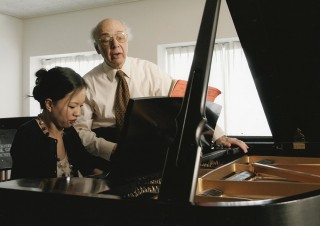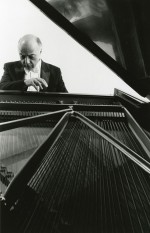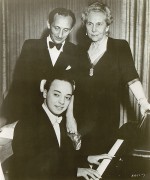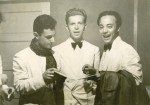Column Name
Title

Seymour Lipkin with Rui Shi (Pre-College '99; BM '04, MM '06, piano).
(Photo by Peter Schaaf/Juilliard Archives)Seymour Austen Lipkin, piano prodigy, acclaimed conductor, and beloved member of the Juilliard faculty for almost 20 years, died on November 16 at the age of 88 in Blue Hill, Me., where he was the artistic director of the Kneisel Hall Chamber Music Festival. Born on May 14, 1927, Lipkin grew up in Detroit and at age 11 went by himself to Philadelphia, where he, and later his sister, began studying at the Curtis Institute of Music. In 1948, he won the Rachmaninoff Fund Piano Contest, beating out Gary Graffman and launching a high-octane career as a recitalist. But since childhood he had always been conducting, and he started his apprenticeship in the 1940s, working under Serge Koussevitsky at Tanglewood, George Szell in Cleveland, and Leonard Bernstein at the New York Philharmonic. That said, he continued practicing the piano for four to six hours a day his whole life and returned to performing, to great acclaim, in the 1990s. He joined the Juilliard faculty in 1986 and also taught at Curtis, Manhattan School of Music, New England Conservatory, and Marymount College in Tarrytown. Piano faculty member Jerome Lowenthal (MS '56, piano) paid tribute to his former mentor and longtime colleague.
In 1949 Seymour Lipkin won the Rachmaninoff Fund Contest; he's pictured with Vladimir Horowitz and Natalia Rachmaninoff.
(Photo by Courtesy of the Juilliard Archives)Body
Seymour Lipkin was a searcher. To borrow a pun from J. D. Salinger, he tried always to See More—with his ears, with his fingers and baton, with his mind, and with his heart. Questioning every note that he played or conducted for its expressive and structural meaning, he demanded of his hands that they communicate that meaning to an ideally perceptive audience. We are told that “a man's reach must exceed his grasp”—when as mourners at his memorial service we watched a video of Seymour's extraordinary performance of Mozart's last concerto, it did seem that his reach and his grasp fit perfectly together.
As in music, so in life. Seymour was an impeccable gentleman, witty and nuanced in conversation, nobly indignant at musical solecisms, but unreservedly generous about performances that broke the rules but carried the musical message. If the music of the German-Austrian classics was closest to his heart, he could nevertheless be transported by Liszt's disperato or by the extreme harmonic subtlety of Debussy's études. He was often puzzled by the vacuous playing that he sometimes heard—“Completely clueless!” he would exclaim, more in sorrow than in anger—but he devoted himself unstintingly to the task of teaching the young. With his colleagues, he was the soul of tact. Instead of telling me that he disapproved of a choice that I had made in Beethoven's “Hammerklavier” Sonata, he said sweetly, “Jerry, I didn't know that you were an A-sharp person.”
I had met Seymour and played for him (Liszt's Funérailles) in 1949, not long after his triumph in the Rachmaninoff Fund Piano Contest. He spoke to me with great generosity and, more remarkably, spoke about me to others. This set a pattern of mentorship that gradually developed into collegiality and friendship. The decades yielded a great variety of anecdotes. Can I forget the memorable Long Island concert in which I played Bartók's Third Concerto under his baton? Memorable, certainly, because of the musical collaboration, but not less so because, having enjoyed too intense a train conversation with Sylvia Rosenberg (Diploma '51, violin; faculty 2007-present), I forgot to change trains; finally, covered with snow, I arrived at the concert hall when the orchestra was already on stage and preparing to substitute a Brahms Symphony for the Bartók.
When I had first known Seymour, he was a star virtuoso pianist, but that category was too narrow for him and, under the tutelage of Leonard Bernstein, he became one of the important American conductors. Then one day in the 1990s came the news that he was returning to the piano with, I think, the Rachmaninoff Rhapsody on a Theme of Paganini. Once again, he shone as one of the bright lights of American pianism. To his much admired activity as concert performer and recording artist, he added a major presence as pedagogue at Juilliard, Curtis, New England Conservatory, and, notably, at his summer chamber festival in Blue Hill, Me. Happily married to the lovely Ellen Werner Lipkin, admired by his colleagues, cherished by his friends, and adored by his students, he was a fortunate man. We who knew him were also fortunate.







